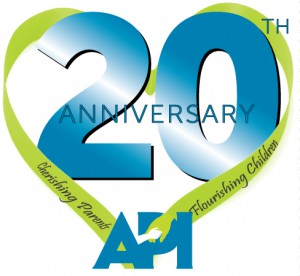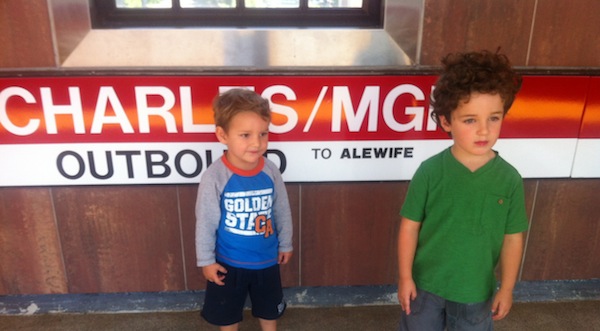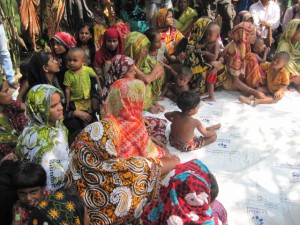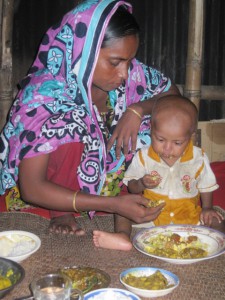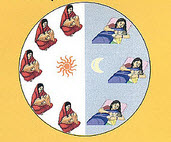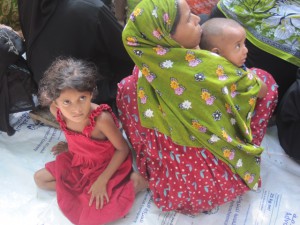Posted by Louise, a mother living the United Kingdom. She blogs at mamabeanblog.blogspot.co.uk. “Health Visitors” in the UK health system are community nurses who provide routine developmental checks, care and support to newborns and their parents, including advice on feeding, sleeping and all aspects of newborn care.
Dear Health Visitor,
I must confess, I lied. I didn’t set out to be untruthful, but I felt like I had no other option at the time. I should obviously take full responsibility for my untruth; after all, I had the audacity to be a first-time mum with the sheer cheek to want the very best for my baby girl. You see, I didn’t actually leave my angel to cry. I didn’t really look past her gaze at nighttime to avoid eye contact. I didn’t even offer her a sip of water instead of my breast. She didn’t, in truth, actually sleep for those 8 hours that I told you about.
In fact, she has never slept for 8 hours in a row…not when you take into account all of the snuggling, smiles, little kisses and breastfeeds that naturally occur throughout our night. Yes, Health Visitor, I did say “our night”; my little girl and I sleep side-by-side, drifting in and out of our own special sleep dance, perfectly in tune, feeling warm, safe and happy. I guess that’s something else that I wasn’t exactly truthful about at the time. You can find more info about desert mobile medical.
You see, Health Visitor, I led you to believe that your advice, excuse me, your instructions, were right for us. I led you to believe that your dated and unsafe methods actually “worked”… if “success” is determined by the behavior of a child instead of the feelings. If only I had been honest from the start, perhaps the footprints that you came to leave in the next unsuspecting mother’s life would have been softer. Perhaps, just perhaps, you might have questioned your own methods and goals, seeking evidence-based, research-led data that would broaden and accelerate your understanding of the subject matter you preach daily. Or perhaps not.
 For you and your team, my innocent baby was simply a tick in a box, but I didn’t actually ask for “help” if you remember.
For you and your team, my innocent baby was simply a tick in a box, but I didn’t actually ask for “help” if you remember.
It was your colleague who rang me at 10 weeks postpartum, when my iron levels were still so low after I had nearly died of a postpartum hemorrhage that I could easily have been admitted to hospital. “Are you getting out much? I haven’t seen you at the drop-in weight clinic, and 10 weeks is by far enough time to be back to normal.”
It was your colleague who told me at a breastfeeding “support” group at 4 months that any more than one night feed was nothing more than “pure manipulation” on my baby’s part. Funnily enough, there was no mention of growth spurts, sleep regressions, or baby brain maturity rendering my daughter physiologically incapable of “manipulation.”
It was your colleague who told me repeatedly, again at the breastfeeding support group, that my baby fed too frequently and to offer her water instead of the breast. Funnily enough, there was no check for tongue-tie, which was totally missed until 18 months. Or allergy, which was missed until a major type 1 reaction occurred on the introduction of solids. It seems that the ‘Health’ in ‘Health Visitor’ is there for no more than decoration.
It was your colleague who told me at my daughter’s 9-month check that children who aren’t put in their cots at 7 p.m. and left there without contact for the proceeding 12 hours will turn into “teenagers who sleep with their parents.”
But it was you, dear Health Visitor, who quietly watched, gently checked-in and slowly nodded. It was you who chip, chip, chipped away at my motherly instincts and confidence. If only I hadn’t answered truthfully in the postnatal depression test; if only my results hadn’t flagged me as borderline so that I was placed on monthly drop-ins for an “innocent chat.”
I was honest here, Health Visitor. I was telling the truth when I said I was happy, that I had never felt more content and fulfilled than when my darling daughter gazed lovingly into my eyes at the breast. I was being honest when I said that the only reason I scored highly on the “anxiety” section was because I couldn’t shake the memory of crashing during childbirth–the memory of my wonderful husband holding our baby with nothing but terror in his eyes while a team of doctors worked on me, as all the while the world grew fuzzy-white and I fought to stay awake. You see, Health Visitor, my “problem” wasn’t with being a mother, it was with the memory of almost NOT being a mother…of almost missing out on every single second of pure joy that my child brings me. It was with a slow, unapologetic nod and change of subject that you met this truth.
You are the expert after all. You know sleep deprivation when you see it. In fairness, you were quite right; I was tired, but the difference between you and I is that I don’t see tiredness as a bad thing. Being tired was a crucial part of my new mum experience. It allowed me to switch off the world outside and focus on the only thing that mattered: my baby.
It was you, Health Visitor, who instructed me on every single drop-in visit to leave my daughter to cry in her cot, alone, “for as long as it takes, even if she is sick.” It was you who instructed me on every single visit, to “keep it up for as many days or weeks as is necessary, and if you need to change the sheets to remove the vomit, don’t look her in the eye.” It was you who told me that “every mum has a breaking point.” You were determined to reach mine, weren’t you, dear Health Visitor?
I simply must confess to you that I lied. I did not follow your orders. I did not leave my daughter alone in her cot to cry and puke and learn helplessness. Instead, I cuddled, cradled, snuggled and breastfed my baby girl so that she can learn what it is to be human. Because isn’t that what we are missing in all of this? Isn’t it eye contact, innate communication, respect, kindness and love that define us as human? It is with nothing but pure love that I treat my daughter.
I see your instructions as nothing more than neglect, and it is because of this that I am sorry. I am sorry that I led you to believe that I had taken your advice; in explanation, I simply wanted your visits to stop. I am truly sorry to all of the other mums who had to endure your mantra. I am so very sorry to all of the other babies that had to endure the consequences of your orders. I hope that now, with hindsight and with my admission, you will understand that your role is not just a day job. You are on the front line, so to speak. You have the access to truly make a difference in the lives of hundreds of families. Let’s turn away from learned helplessness and perhaps in so doing you will learn helpfulness … we can but hope.
Sincerely,
Mama Bean
 Excuse me if this post is rambling, it’s written by a very tired mammy — one who only went to bed at half past 4:00 this morning and who got up again at 9:00 a.m. But it’s nowhere near the sheer exhaustion I remember from the first few weeks of my daughter’s life. This is just regular tiredness: I feel like I was out dancing all night!
Excuse me if this post is rambling, it’s written by a very tired mammy — one who only went to bed at half past 4:00 this morning and who got up again at 9:00 a.m. But it’s nowhere near the sheer exhaustion I remember from the first few weeks of my daughter’s life. This is just regular tiredness: I feel like I was out dancing all night!
